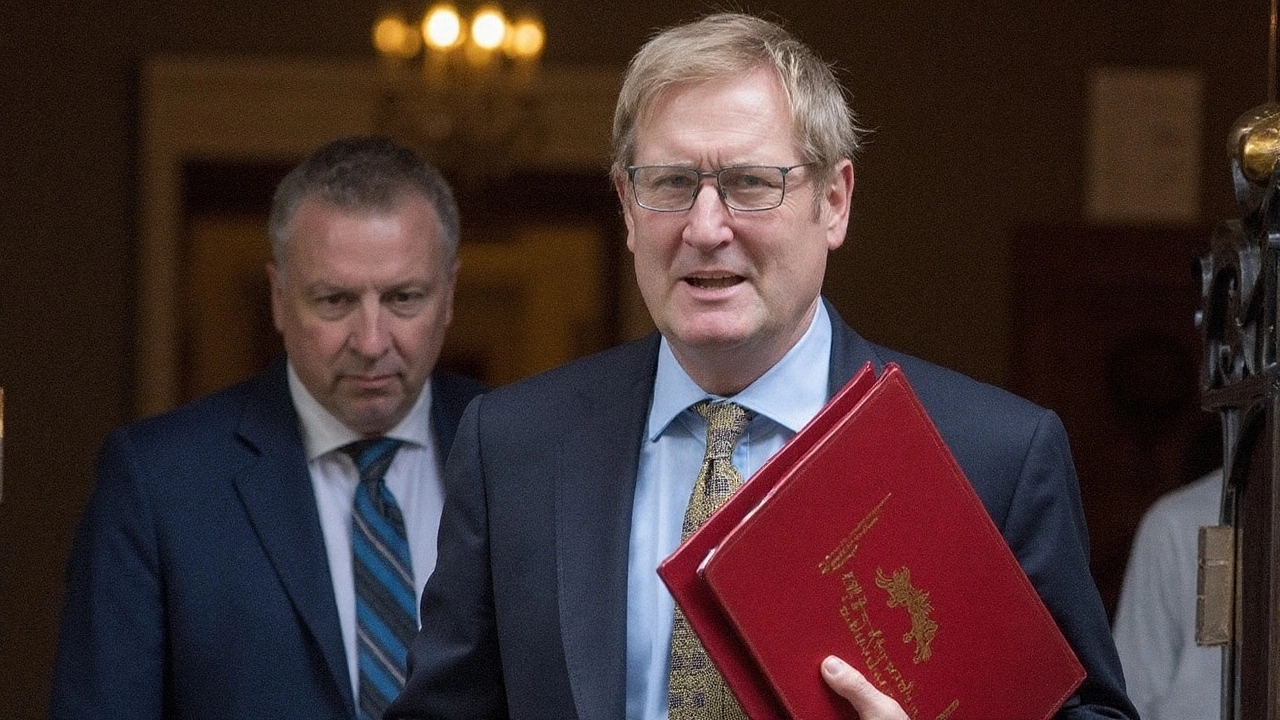What happened and why it hurts
A deputy prime minister quitting over a tax technicality is a brutal headline for any government, and this one lands hard on Labour. Angela Rayner resigned on September 5, 2025, after an investigation said she breached the ministerial code by underpaying stamp duty on a flat in Hove. The report did not question her honesty. It said she acted with integrity, but failed to meet the standards expected of ministers by not seeking expert tax advice. That nuance won’t save the optics. Money stories in politics rarely do.
Keir Starmer accepted her resignation in a handwritten note “with real sadness,” calling her a true friend and a symbol of the social mobility he wants the country to see in government. You could feel the regret. But emotion won’t fix the practical problem: Rayner was doing a job no one else can fully replicate. She was a bridge—between the party’s left and Starmer’s centrist team, and between Westminster and the working-class voters Labour needs to keep.
The ministerial code is blunt about expectations: ministers must uphold the highest standards, avoid any perception of personal gain, and take professional advice where needed. That last duty is what tripped her. Stamp duty rules are fussy, especially when second-home surcharges, main-residence tests, or ownership histories come into play. The report suggests this was an error in process, not intent. The public rarely separates the two. “Tax” plus “politician” equals judgment day.
Rayner’s political value came from where she stood and how she spoke. She grew up far from the establishment, rose through the trade union movement, and never pretended to be anything she wasn’t. Inside the tent, she gave Starmer’s project credibility with activists and affiliated unions. Outside, she cut through. Voters who tune out politicians would stay tuned when she talked about work, housing, and respect. That is not a skill you plug-and-play.
Timing only makes the blow heavier. Labour is still in its early stretch back in government after years in opposition, trying to build a record that screams competence and delivery. Now it owns a high-profile resignation tied to tax. Conservatives do not need to exaggerate to land a hit. They will say Labour talks probity but doesn’t live it. Even if that’s unfair on the details, the narrative writes itself.
Rayner’s exit immediately lights up two fronts: the public story about trust, and the internal politics of who speaks for Labour’s left inside Cabinet. She was Starmer’s firewall with activists who backed Labour’s workers’ rights agenda and pushed the party on pay, unions, and housing. Without her in the room, those voices feel further from the table. That matters when the government needs momentum on living standards.
The deputy leadership contest is now on—the first time Labour has picked a deputy while in government since 2007, when Harriet Harman won under Gordon Brown. Expect a clean ideological line: candidates who promise to guard the party’s left flank, and candidates who pitch competence and message discipline. The ballot will draw in members and affiliates across the country. It will be noisy, emotional, and watched for any sign that the coalition that delivered power is fraying.
Rayner is not going away. She will return to the backbenches as a proven campaigner who can fill a hall and light up a picket line. No one expects open disloyalty. She does not need to move against anyone to have influence. Her very presence outside Cabinet turns her into a focal point for activists, union leaders, and MPs who want Labour to push harder on workers’ rights and housing. That gravity is real, even if she stays disciplined.
Starmer moved quickly with a reshuffle. David Lammy, the former foreign secretary, is now deputy prime minister. He brings profile, media reach, and Cabinet experience. Still, the fit is different. Rayner’s roots and her rapport with the movement were unique. Lammy can steady the ship outwardly, but he cannot supply the same bond with the left or the same working-class shorthand that made Rayner such an effective translator of Labour’s message.
This is where policy comes in. Rayner was a driving voice behind the workers’ rights package that Labour sold as a “new deal” for people in insecure work—fairer contracts, stronger rights from day one, better enforcement. She pushed on housing standards and regeneration, talking more like a tenant than a minister. That tone gave the agenda life. The policies can survive without her, but they risk feeling less urgent. Deadlines slip when the champion leaves.
Inside the party, the factions are already counting votes. A left candidate for deputy leader will try to turn the contest into a mandate to press Cabinet on pay, public services, and industrial relations. A centrist will promise grip and message discipline, arguing Labour must hold the centre if it wants to lock in power. Starmer’s team will insist the contest is not a referendum on him. That’s true on paper. In practice, the result will be read as a test of his hold on the movement.
There are practical steps No. 10 can take now. Tighten guidance on tax and property for ministers. Require written confirmation of professional advice on complex filings. Publish clear timelines when issues arise, so the drip-feed stops. The faster the government shows it has learned from this, the less oxygen for the charge that it is lax about rules.
Let’s talk about the stamp duty part in plain English. Stamp duty is a tax on property purchases. The rate depends on price and, in many cases, whether you already own another home or qualify for reliefs. It is easy to get wrong without a specialist, especially if your living arrangements changed or a previous property sale complicates the picture. The report says Rayner did not take advice she should have. That is the breach. Not intent. Not concealment. A failure to follow process at the top level where the bar is highest.
Will voters care beyond the headlines? Some will shrug at a technical tax mistake. Others will slot it into a story about politicians and money. The bigger risk to Labour is not one by-election or one bad poll. It is the slow leak of moral authority. The party promised better standards. That promise is part of its brand. When you run on clean government, you cannot afford any smudge, even if the facts are mild.
For Starmer, the personnel jigsaw now matters as much as the message. He needs someone in the deputy role who can talk to the movement, grip delivery, and carry the government’s case into towns and suburbs that decided the last election. He also needs to keep his most senior ministers aligned on spending, reform, and the pace of change. Cabinet unity is not a slogan; it’s the only way to land a budget, a health plan, or a housing bill without political blood on the floor.
The calendar offers no mercy. The legislative programme is heavy. Public services are stretched. Pay rounds with unions are sensitive. A deputy leadership fight will eat bandwidth, airtime, and patience. If the contest turns bitter, it will spill into conference season and give the opposition a clip reel they will replay all winter.
What about Rayner’s own future? She can rebuild. Many senior figures have come back from worse. She has a base, a profile, and friends across the movement. If the government delivers, her return to Cabinet later on is possible. If it stumbles, her stock on the outside rises. Either way, she remains a force.
The Conservatives will press the line that Labour cannot manage its own house. Expect questions about other ministers’ disclosures, property interests, and advice logs. Labour needs straight answers and quick fixes, not legalese. Voters forgive mistakes more than they forgive drift.
There’s a final layer: culture. Rayner made Labour feel like a party that remembered who it was for. Not just in policy terms, but in posture—the accent, the stories, the impatience with waffle. That style matters when you want to reconnect with people who stopped listening years ago. The government now has to prove it can hold that connection without the person who carried so much of it.
So yes, this is a lose-lose. Labour loses a rare voice at the top. It takes a reputational hit on standards. It opens a contest that could expose old wounds. And yet politics does not pause. The choice of deputy, the handling of the rules fallout, and the delivery on wages, housing, and services will decide whether this becomes a footnote—or the first crack that widens under pressure.

What comes next for Labour
- The ballot: The deputy leadership race will test the balance of power inside Labour. Watch where trade union endorsements land and how membership sign-ups move over the next few weeks.
- The message: Expect No. 10 to push a tight line—respect for the rules, swift action, and focus on delivery. Any drift or mixed signals will keep the story alive.
- The personnel: David Lammy’s appointment stabilises the top table. Starmer still needs a day-to-day organiser who can do the movement politics Rayner handled. That could mean elevating a strong party figure to a role that bridges Cabinet and the grassroots.
- The policy: Workers’ rights and housing will be the early test. If the bills are tight and the timelines clear, the government shows it can move past this. If they slip, critics will say Rayner’s exit robbed those plans of their engine.
- The politics: Rayner on the backbenches changes the mood music. Expect packed town halls, union rallies, and conference fringe events with queues down the hall. She will shape the conversation whether she tries to or not.
Starmer’s project was built on unity, competence, and a promise to govern for people who feel ignored. All three are in play now. The next few weeks—how the party chooses a deputy, how it shores up standards, how it keeps its law-making on track—will tell us whether this is a stumble or a slide.



